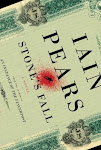
The Watercooler Effect is a very timely piece of work. It is, after all, election season. My inbox has been overflowing with forwarded bits of political "information," most of it nonsense. I'd always believed this was primarily designed to sway my vote one way or another, but it turns out there may be other forces at work.
I was most interested in this book because of my interest in political rumors, and it is interesting to consider them in the light of some of the information presented here. For example, people spread political gossip not just to sway your vote, but also to reinforce their own status within the group; according to DiFonzo, "people are are not always primarily interested in the truth when they speak together, but rather to find ways to affiliate and bond with one another."
Another interesting issue is that of fact-checking. I have often wondered why people who forward those viral emails don't take a minute or two to check their facts. After all, who wants to look foolish, forwarding a hoax? Apparently, that is part of the answer: people don't check their facts because they don't want to embarass the person who sent them the rumor. (That has never stopped me, for the record. I am in favor of embarassing mass-forwarders whenever I can.) No excuse, in my opinion, for some of the dreck that gets passed around.
Generally speaking, this is an interesting and timely book, but you won't find any startling revelations here. There are some interesting anecdotes and a lot of common sense information, including some techniques for managing the rumor mill that might be useful for those readers forced to deal with office politics.
My copy of The Watercooler Effect was an Advanced Reader Copy. You can order your copy here.
Do you know where the term "scuttlebutt" comes from? Check the comments for the answer!
I was most interested in this book because of my interest in political rumors, and it is interesting to consider them in the light of some of the information presented here. For example, people spread political gossip not just to sway your vote, but also to reinforce their own status within the group; according to DiFonzo, "people are are not always primarily interested in the truth when they speak together, but rather to find ways to affiliate and bond with one another."
Another interesting issue is that of fact-checking. I have often wondered why people who forward those viral emails don't take a minute or two to check their facts. After all, who wants to look foolish, forwarding a hoax? Apparently, that is part of the answer: people don't check their facts because they don't want to embarass the person who sent them the rumor. (That has never stopped me, for the record. I am in favor of embarassing mass-forwarders whenever I can.) No excuse, in my opinion, for some of the dreck that gets passed around.
Generally speaking, this is an interesting and timely book, but you won't find any startling revelations here. There are some interesting anecdotes and a lot of common sense information, including some techniques for managing the rumor mill that might be useful for those readers forced to deal with office politics.
My copy of The Watercooler Effect was an Advanced Reader Copy. You can order your copy here.
Do you know where the term "scuttlebutt" comes from? Check the comments for the answer!






3 comments:
According to DiFonzo, the word "scuttlebutt", which usually refers to rumors or gossip, comes from an old military term for the pre-cursor of the modern water cooler. This description is from Herman Melville's 1850 novel, White Jacket:
The scuttle-butt is a goodly, round, painted cask, standing on end and with its upper head removed, showing a narrow, circular shelf within, where rest a number of tin cups for the accommodation of drinks. Central, within the scuttle-butt itself, stands an iron pump, which, connecting with the immense water tanks in the hold, furnishes an unfailing supply of the much-admired Pale Ale...
Hundreds of sailors would gather round the scuttle-butt in the course of a day, and it became a prime spot for exchanging information.
Very interesting! I am fascinated by the derivation of words, so I can now entertain people at cocktail parties with the story behind the origin of "scuttlebutt" :)
I'm looking forward to reading *The Watercooler Effect*. It sounds like it might be dry (no pun intended) in parts, but I'm sure I'll gain some insight into the rumor mill and the people who feed it.
I, too, am quick to zap back a snopes.com article to unsuspecting people who forward rumors to me (especially those that promise financial gain if I follow the instructions and doom if I don't!)
When I see those subject headers saying Fw: blah blah blah, I immediately hit the delete key.I never,ever even bother to open those emails. I absolutely despise them!
doot65[at]comcast[dot]net
Post a Comment